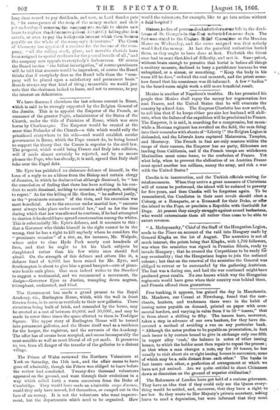Mr. Eyre has published awelaborate defence of himself, in the
form of a reply to an address from the Bishop and certain clergy of Jamaica, in which he declares that although dismissed, he " has the consolation of feeling that there has been nothing in his con- duct to merit dismissal, nothing to occasion self-reproach, nothing to regret." As for the killing of Mr. Gordon, " he suffered justly," as the " proximate occasion" of the riots, and his execution was most beneficial. As to the excesses, under martial law, " excesses must always take place under martial law," and as for the time during which that law was allowed to continue, if he had attempted to shorten it he should have spread consternation among the whites. This is substantially Mr. Eyre's defence, and it amounts to this : that a Governor who thinks himself in the right cannot be in the wrong, that he has a right to kill anybody whom he considers the "proximate occasion" of a riot, as, for instance, Mr. Walpole, whose order to close Hyde Park nearly cost hundreds of lives, and that he ought to let his black subjects be slaughtered rather than his few white -ones should feel afraid. On the strength of this defence and others like it, a defence fund of 6,0001. has been raised for Mr. Eyre, and Southampton is about to give him a grand banquet—cats of piano- wire beside each plate. One man indeed writes to the Standard to suggest a testimonial, and we recommend a monument, the design—Governor Eyre as Justice, trampling down negroes, triumphant, undaunted, and blind.






























 Previous page
Previous page